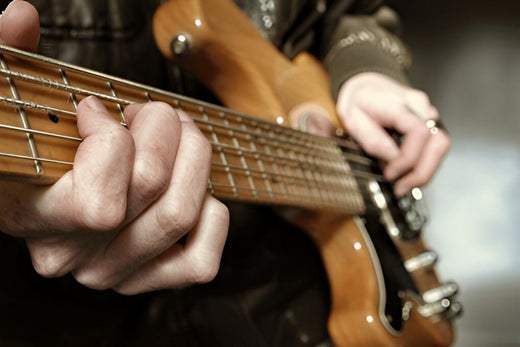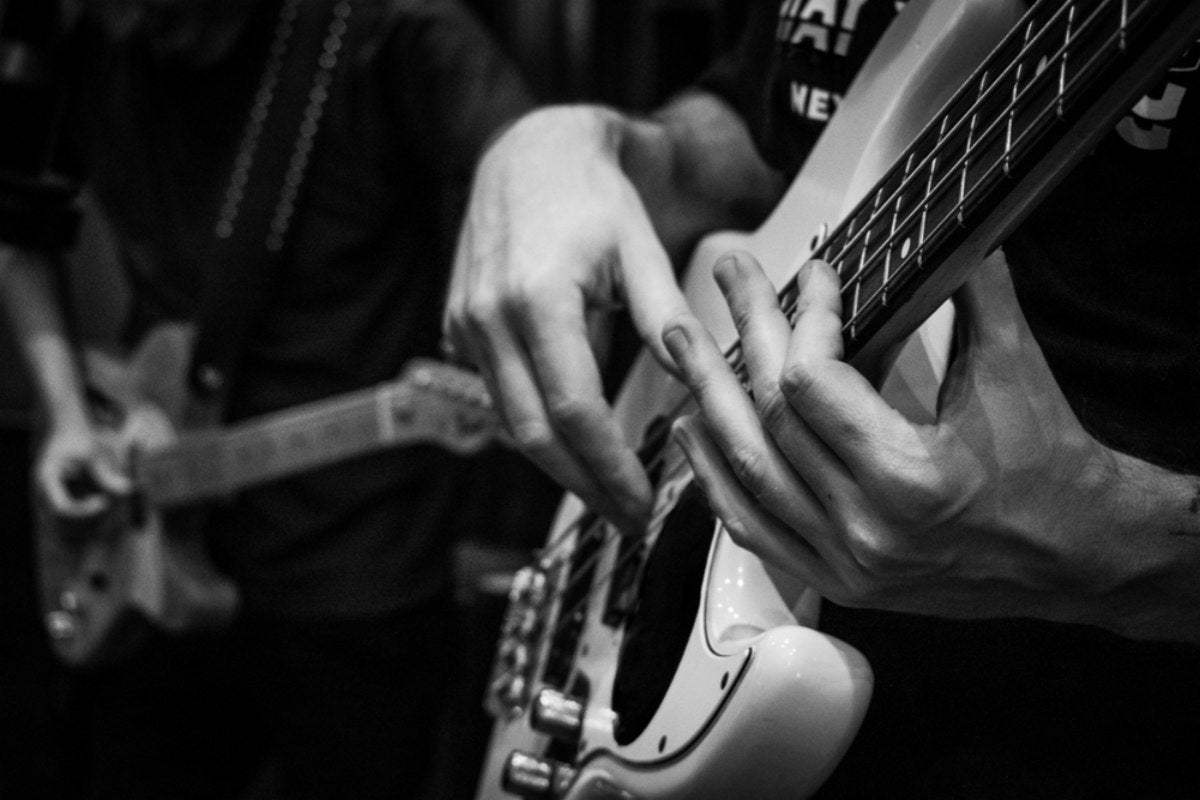Bass guitars and electric guitars look incredibly similar but are unique instruments that are played in completely different ways. But what are the differences and which is the best option for you, let’s get started with…
The similarities between a Bass Guitar and an Electric Guitar
Both are constructed using a body, which is normally made of wood. This holds the pickups, the hardware, and the controls. A neck is attached to this which is again normally constructed from wood. This usually has a fretboard attached, and tuners are placed on the headstock at the end of the neck.
In terms of size and weight, bass guitars tend to be slightly larger, heavier, and have a longer, thicker neck.
Even though there are clear differences which are obvious to those who know how to tell one from the other, the average person looking at a band on stage probably couldn’t tell who is playing an electric guitar and who is playing a bass guitar.
So, what are the differences between a Bass Guitar and an Electric Guitar?
The easiest way to tell is usually the number of strings or the number of tuning machines on the headstock (which will be the same number). Most bass guitars have four strings, but some have five, and fewer still have six. Whereas, the majority of guitars have six strings, although some may have 12.

Bass guitars are tuned lower than a regular electric guitar and have much thicker strings, allowing them to produce notes with far lower frequencies.
As mentioned, bass necks are longer than the neck on an electric guitar, so if one guitar on stage has a longer neck, that is more than likely a bass guitar. Also, 99.9999% of bands only have one bass guitarist, while they may have two or even more guitarists. Therefore, if you see a band with three people playing a guitar, one of which has a larger guitar with a longer neck, that will be the bassist.

Next, although this isn’t always the case, most bassists tend to stay near the rear of the stage, close to the drummer. This is especially the case if there are two electric guitarists in the band.
And finally, the majority of bassists play the instrument with their fingers, although some do use a pick. Conversely, most guitarists play with a pick, although some may only use their fingers such as Jeff Beck and Mark Knopfler.
Bass or Guitar - which is the right instrument for me?
From my experience, there are two types of bass guitarists, those with an absolute love of the instrument and those who wanted to play electric guitar but were either too lazy to practice or just not very good at it. They then decide that playing the bass must be easier because it only has four strings and you don’t have to learn and play chords
I have played with a number of great bass players, including some of the top session bassists in the business and every one of them was most definitely not a failed electric guitarist. They love the lower frequencies that a bass guitar can produce, they adore being part of the backbone of the band - the rhythm section - with the drummer, and they enjoy the grooves that only a bassist can create.
However, I have also played with bassists who started off on electric guitar but did go on to master the bass. They again had the love of the depth that only a bass can create, so soon realized that learning the electric guitar was not for them and made the switch.
Therefore, to pick the perfect instrument for you to learn, think about what stands out to you when you listen to a song. Is it the underlying rhythmic feel and groove of a song, or is it the higher-pitched notes that give it its shimmer? If you are concentrating on the foundation of the song, the glue that holds it all together, then you should get yourself a bass guitar. However, if it’s the fancy bits - the solos, the intricate picking sections, etc. then you’re an electric guitarist.
Electric Guitarists vs Bass Guitarists - Personality Stereotypes
Next, I’m going to discuss a common musical stereotype, which from experience, does seem to be true.
Personality-wise, bass players don’t usually want to be the focus of attention. They are usually happiest at the back of the stage interacting with the other half of the rhythm section - the drummer - and generally keeping themselves out of the limelight. They see their role as maintaining the all-important foundation of the song, along with the drummer, allowing the lead electric guitarist, keyboard player, and singer to go off on musical tangents to create excitement within the songs.

Electric guitarists, on the other hand, usually want to be the center of attention, they want the spotlight on them as they play the long complicated solo from one of their songs. They love being at the very edge of the stage, with the fans going wild as they strut their musical chops.
However, as with everything, there are exceptions. Bass players like Flea from the Red Hot Chilli Peppers, and Les Claypool from Primus are mesmerizing on stage and more than happy to be the center of attention.

On the other hand, some guitar legends like David Gilmour from Pink Floyd are content with just standing there in a T-shirt and jeans with a massive visual display all around him and the band so that you hardly notice that he is even on stage, as can be seen from the picture below:

My advice…
If you’re still unsure about which option to choose but would really love to be in a band with your friends, go for the bass guitar. It is an easier instrument to get to band practice and performance level, so you’ll be playing with bands in much less time than if you want to learn electric guitar.
Also, since there are a lot more guitarists in the world than bassists, especially good bassists, more bands are looking for a bassist than there are looking for guitarists, so you will have more opportunities and options. Plus, if you enjoy being busy, you could even play in two or three bands at the same time, like a lot of bassists I have known over the years.
Generalizations
Due to the nature of this subject, I have had to include a number of sweeping generalizations to keep the content accessible and easy to understand. Lots of them are not really that relevant, such as the fact that many guitar bodies and especially necks are not made from wood, or that short-scale bass guitars are only a little longer than some electric guitars, etc.
But one is very important and that is the common belief that a bass guitar is easier to play than an electric guitar.
Yes, as mentioned, if you want to get into bands quickly, it will be much quicker learning the basics on a bass guitar, than it would be on an electric guitar. But that is just the basics, to master either instrument takes a lifetime of study, so please don’t think that you will get bored of playing bass because you will become proficient on the instrument in no time at all. As with the electric guitar, there are so many techniques to learn, and so many musical styles that can be incorporated into your playing. Plus, the belief that you don’t need to learn chords is rubbish, most bass players use chords, either as the basis for a series of single notes or even strummed as the full chord.
Wrapping it Up
You should now know the differences between an electric guitar and a bass guitar, as well as how to identify either if you see them in real life or in a picture. You should also know which instrument is the right choice for you and perfectly matches your personality.
Whichever one you choose, love your guitar, and practice, practice, practice, until it becomes part of you. Playing any instrument rewards you in so many ways, so enjoy the journey, and who knows where it may lead you.





